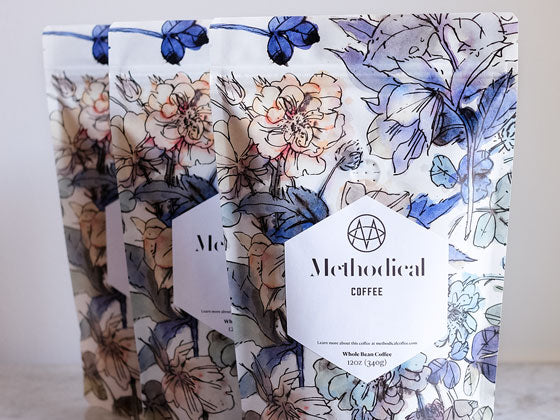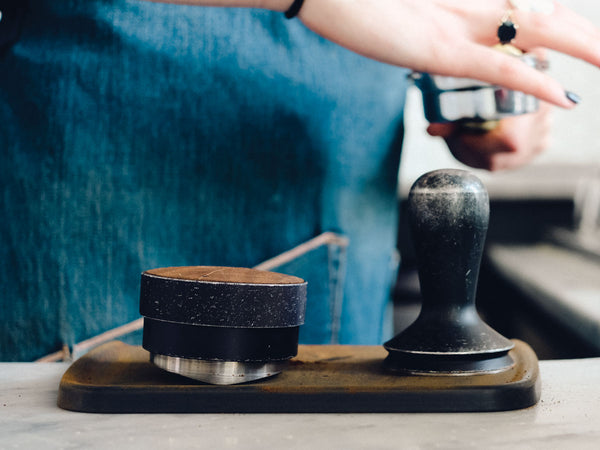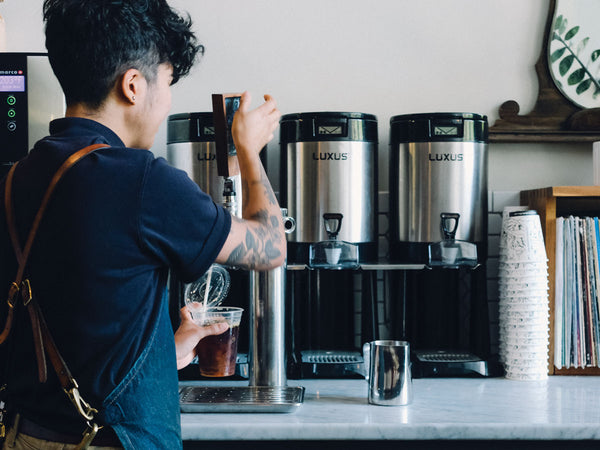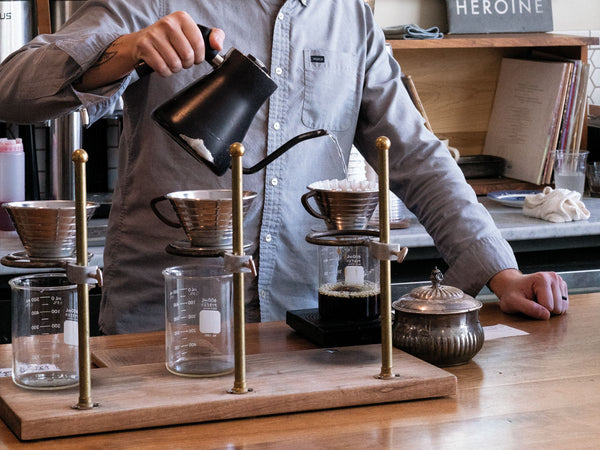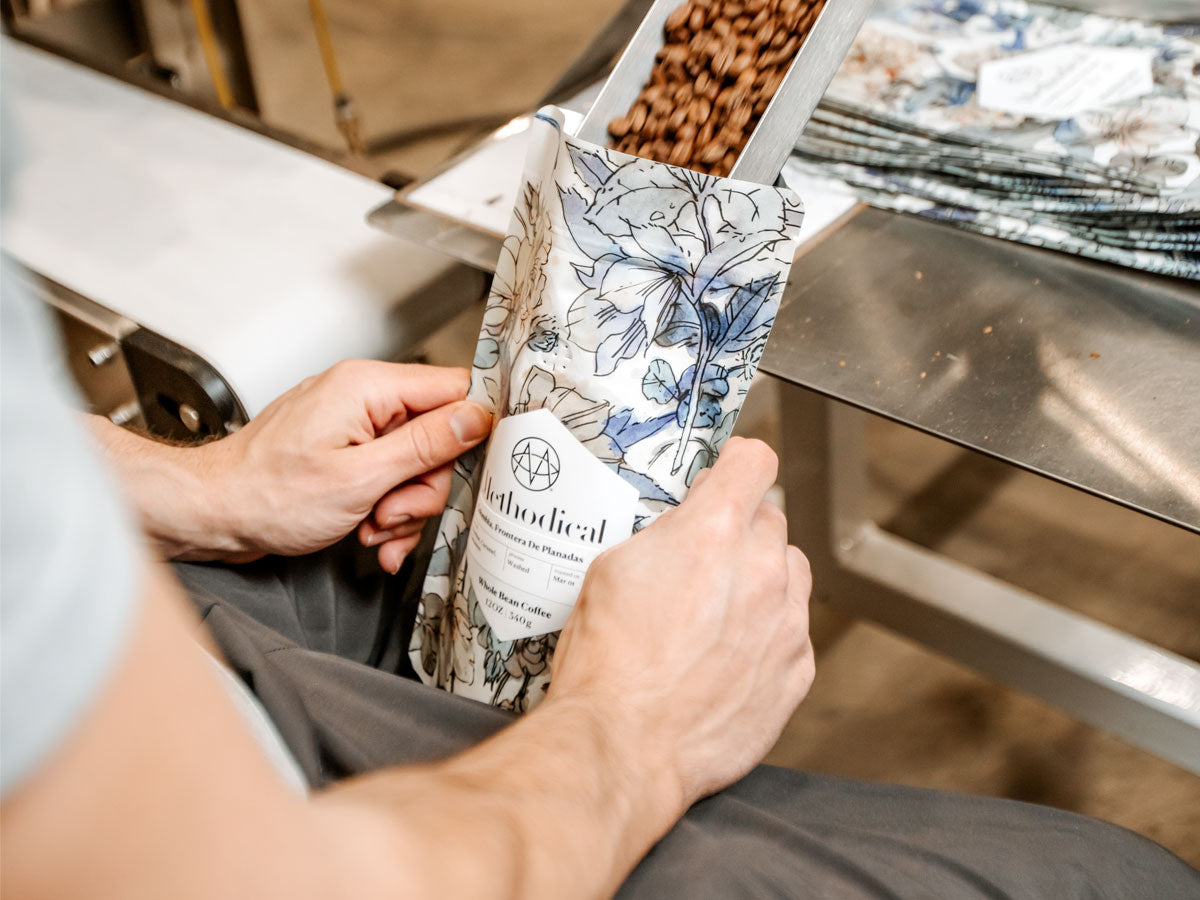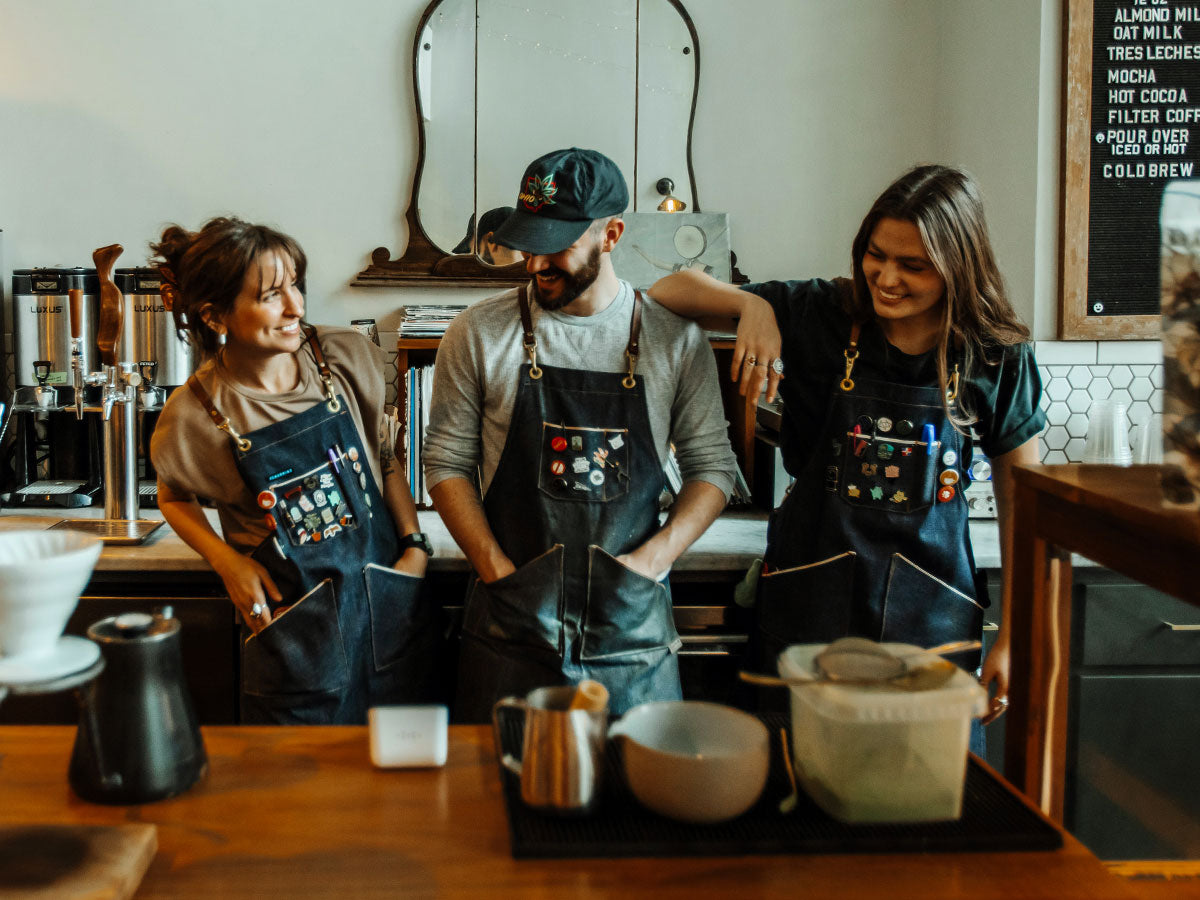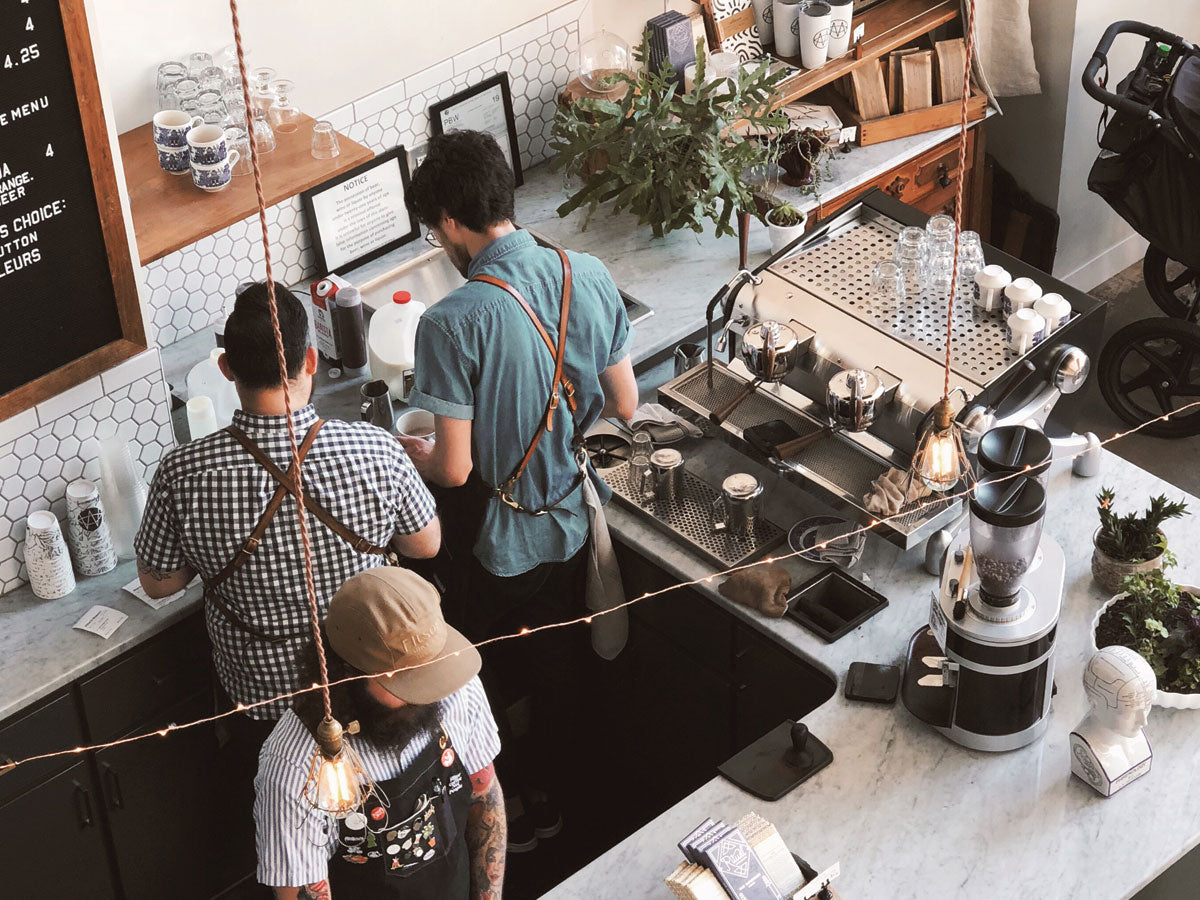There is a lot that goes into opening a coffee shop, and having the right equipment is high on the list – as we’ve learned first hand. In this guide, we’ll show you what coffee shop equipment you’ll need to get started, how you can expect to pay, and options for where to buy equipment for your cafe.
What do we know about coffee shops?
Now 8 years into the coffee business, we’ve opened 3 cafes, a roastery, and a commissary kitchen, and we’ve learned quite a bit along the way. Mostly learning through our mistakes, but also through some successful hunches. But one of the things we’re often asked by our wholesale partners is what equipment we recommend. There are a lot of manufacturers out there promising their equipment is the best. Sometimes we agree with them, but sometimes we don’t. But what we’ve learned is you don’t want to be limited by your equipment. Your baristas are the craftspeople, and your cafe equipment is their tools. And having the right tool for the job makes all the difference. So here are our recommendations for coffee shop equipment.
What you need to start a coffee shop
Before you start building your equipment list, there are a few hurdles you need to clear to open a coffee shop. First is a vision for the type of experience you want to create, followed up by a business model for how you’ll serve your community and generate revenue. Then you’ll need to establish your location and how you’ll finance the build-out. Then you can turn your attention to your cafe equipment list. To learn more about the steps we take when opening a new coffee shop, check out our guide to starting a coffee shop.
Coffee shop equipment list
Espresso Machines
For most coffee shops, espresso is the heart and primary offering. It’s also the most complex in that it requires the most expensive and complicated equipment. Getting the wrong equipment can not only be expensive, but can cost you in lost revenue as well.
LaMarzocco Linea PB
Anything LaMarzocco makes is going to be a good decision. They’ve proven themselves as the leader in espresso by creating the most timeless and hardworking machines available. The Linea is a classic framework that’s now over 30 years old, and the PB model adds in programmable volumetric dosing, which allows you to reproduce the same shot of espresso every time. It’s one of the best machines we know. Two of our cafes use Linea PB’s and after hundreds of thousands of shots of espresso, they’re still going strong.
Slayer
It’s impossible to walk into a cafe and not notice the Slayer. It’s a beautiful machine that marries wood and metal better than anything out there. It’s also an incredible machine to work on by offering flow rate control to perfectly dial in your espresso. We’ve been using a Slayer at one of our cafes for over 8 years now and it’s still going strong. We also get compliments on it nearly every day.
Sanremo
If you’re really looking to knock some socks off, check out the Samremo Cafe Racer. A machine inspired by the classic cafe racer motorcycle. This machine offers some incredible features like preinfusion, volumetrics, and loads of programmability.
Learn more: Introdution to Espresso | How to Pull a Shot of Espresso
Espresso Grinders
Grinders come in all shapes, sizes, and price points. And they’re often made specifically for certain jobs such as espresso, filter, or bulk. Getting the right tool for the job makes all the difference.
Mazzer Super Jolly
Mazzer has been the cafe standard for a while. The Super Jolly is a doserless grinder with electronic dose adjustment, making it a breeze to use.
Mahlkönig E65S
Mahlkönig makes our favorite commercial grinders. The E65S is part of a new line of grinders that’s quieter and harder working than their previous line.
Learn more: How to Grind Coffee Beans
Espresso Accessories
There are many other tools and accessories that complete the espresso package. Here are tools you should be sure not to forget.
Pitcher Rinser
This handy tool allows you to quickly rinse your pitchers to keep them clean during busy rushes.
Pitchers
We recommend two sizes of pitches, one for smaller drinks like cappuccinos and one for larger drinks like lattes. Having the two sizes will allow you to properly steam your milk for the perfect texture.
Knock Box
This tool allows you to quickly remove the espresso puck from your portafilter without harming the portafilter basket or your bar.
Tamp Mat
A rubber mat made especially for tamping to preserve the life of your countertop and your portafilters.
Distribution
This tool evenly distributes the espresso in your portafilter to ensure a flat level espresso bed for proper espresso extraction.
Tamp
This tool compresses the espresso in the portafilter in order to produce a properly extracted shot of espresso.
Batch Brew
Batch brewers are the easiest way to produce large quantities of brewed coffee. They come in a range of batch sizes, power requirements, and features.
Fetco XTS Batch Brewer
Batch brewers come in 120v and 240v. We highly recommend the 240v as it heats up a lot faster than the 120v. We also recommend the twin pot, which will allow you to brew two different coffees simultaneously.
Coffee Pots
Well-insulated airpots will keep your coffee very hot for a long period of time. Both the lever action airpot or Luxus pot is great. For the first several years we used the lever action but switched to Luxus.
Bunn Bulk Coffee Grinder
If you’re brewing a lot of batch coffee, you’ll want a grinder that can keep up. Bunn makes a very affordable bulk grinder that’s great for batch brewing.
Manual Brew Equipment
If your cafe concept includes a brew bar where you’ll be serving pour overs and the like, there’s a whole host of equipment you’ll need for a well-equipped bar.
Marco Mix Range PB Hot Water Dispenser
Marco makes the best hot water dispensers. You can choose from a countertop or under counter dispenser if you want to keep your countertops clean and clear. There’s also a wide variety of options from multi-temp boilers to adding carbonated water dispensers.
Hario V60 Pour Over
The V60 is a classic pour over brewer. And there are many options to choose from including material and color. Though we love the V60, we are also fans of the Kalita Wave.
Fellow Stagg Kettle
There are a lot of great gooseneck kettles out there, but for form and function, we love the Fellow Stagg. For a cafe setting, we think the Stagg paired with a hot water dispenser makes the better set up than using electric kettles that take too long to get to temp.
Hario Scale
The Hario scale is one of our favorites in that it looks great, it’s dependable, and it has a built-in timer. This works best for weighing coffee or brewing pour overs.
Learn more: How to Make a Pour Over Coffee
Odds & Ends
There are a few more odds and ends that will make your coffee bar complete.
Toolbox
You will definitely need a toolbox loaded with typical tools such as screwdrivers, wrenches, allen wrenches, and more. This will come in handy when you’re needing to clean your cafe equipment.
Cleaning equipment
Regularly cleaning your equipment will help it last longer and keep your beverages tasting great. This includes brushes, Cafiza cleaning powder, and Rinza milk residue cleaner.
Where to get equipment for your coffee shop
For purchasing coffee equipment, there are a lot of places you can go. But we recommend going to a reputable source. For online shopping, Prima Coffee, Espresso Parts, or Seattle Coffee Gear are great sources. They offer great customer support, fair prices, and if anything goes wrong with your equipment, they’ll help you navigate it.
The other source for purchasing equipment, especially your big ticket items, is going through a coffee technician. A coffee tech is someone who specializes in the installation and repair of coffee equipment. They usually service a territory within a 2-3 hour drive and they’re someone you will definitely want to build a relationship with. Equipment like espresso machines and water dispensers are best installed by a trained coffee technician and not a plumber. These machines can be sensitive and can easily be installed incorrectly. Technicians are also usually distributors for these manufacturers simply because they often source parts through them. And sometimes if you source through a technician you'll receive free installation.
It is also possible to purchase used equipment. This can be a good way to save money, or it can be a complete nightmare costing you far more. One way to ensure you’re not buying a lemon is buying from a reputable business that specializes in refurbishing used equipment. Such as from a coffee technician. This will ensure that someone who knows what they’re doing has gone through the machine and ensured that it’s functioning correctly and nothing will fail on you on opening day.
How much does it cost for a good commercial espresso machine
When considering your budget for an espresso machine, you should consider your expected volume. If coffee is your primary offering and you’re in a bustling location, you should definitely consider a 2 or 3 group head machine. This will ensure you’ll be able to keep up with demand. A single group head machine is smaller and more affordable, but won’t be able to keep up with a rush. A single group head machine, such as a Linea Mini, will cost you around $5,000. A 2 group Linea Classic will cost around $14,000. A Linea PB will cost around $20,000. And a Slayer espresso machine will cost around $25,000.
Don’t forget the coffee
And of course, you can’t forget the most important part, the coffee! Unless you’re roasting coffee yourself, partnering with a reputable coffee roaster will also be a great partner to lean on. They can help you navigate the complexity of operating a cafe and help you source your equipment as well as being your coffee supplier. At Methodical, we love partnering with other coffee shops. Our coffees span the spectrum from dark and roasty to light and bright. Keeping the right amount of bulk coffee on hand is key to healthy cash flow as well as never running out or having too much stale inventory. We’ll help you navigate predicting your coffee needs, which coffees work best for your clientele and offerings, and simply be a sounding board. If you’re interested in talking more about working with us, give us a shout!

